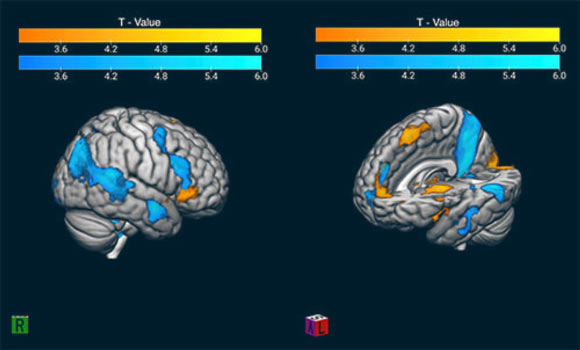Soccer is an excellent social affiliation model, promoting inclusivity, teamwork, community spirit, social change, and personal achievement. Still, the gregarious component could be the reason behind acts of violence and vandalism. In a new study, neuroscientists at Universidad San Sebastián explored the brain mechanisms underlying positive and negative social stimuli in soccer fans during positive and negative social scenarios.

Mendieta et al. used fMRI to measure brain activity in fans of rival soccer teams during match play. This image shows the contrast of winning and losing in the ‘good fanatic brain.’ It shows in warm colors the activity related to a significant victory. The blue scale represents the activation related to a significant loss; this pattern is congruent with the Mentalization Network, which suggests a rationalization process of the pain evoked by the losing scenario. Image credit: Mendieta et al.
“Our study aims to shed light on the behaviors and dynamics associated with extreme rivalry, aggression and social affiliation within and between groups of fans,” said lead author Dr. Francisco Zamorano Mendieta, a researcher at Universidad San Sebastián.
Rivalries run deep in the history of sports, and fans can be very protective of their ‘home’ team and favorite players.
These same fans run the gamut of emotions watching their team succeed or fail over the course of a game or match, cheering when they score or raging at a bad call.
Soccer fans are known for their team loyalty and enthusiasm, particularly in Europe and South America.
To gain some insight into the brain mechanisms behind the behaviors of the fans, Dr. Zamorano and colleagues recruited 43 healthy male volunteers for a functional MRI (fMRI) study.
The participants are fans from the two most popular Chilean soccer teams, considered archrivals.
They were divided into two groups, 22 supporters of one team and 21 supporters of the rival team.
They completed a survey to determine a soccer fanaticism score and underwent psychological evaluations.
All participants were presented with a compilation of matches containing 63 goals.
While the participants viewed the match compilation, their brain activity was measured using fMRI, a noninvasive imaging technique that detects changes in the brain’s blood flow.
The fMRI results showed that brain activity changed when the fan’s team succeeded or failed.
“When their team wins, the reward system in the brain is activated,” Dr. Zamorano said.
“When they lose, the mentalization network can be activated, taking the fan to an introspective state. This may mitigate some of the pain of the loss.”
“We also observed inhibition of the brain hub that connects the limbic system with frontal cortices, hampering the mechanism that regulates cognitive control and increasing the probability to fall into disruptive or violent behavior.”
The team’s findings may shed light on social dynamics in all walks of life.
“People inherently crave social connections, be it through membership in a running club, participation in a book discussion group, or engagement in virtual forums,” Dr. Zamorano said.
“While these social bonds often form around shared beliefs, values and interests, there can also be an element of persuasive proselytism, or ‘group think,’ which may give rise to unreasoned beliefs and societal discord.”
“The zealousness found among some sports fans can serve as a compelling example of intense emotional investment, occasional aggressive behavior and impaired rationality.”
“Understanding the psychology of group identification and competition can shed light on decision-making processes and social dynamics, leading to a fuller comprehension of how societies operate.”
The authors will present their findings this month at the annual meeting of the Radiological Society of North America (RSNA).
_____
Francisco Zamorano Mendieta et al. Brain Mechanisms Underlying Emotional Response in Social Pain. Football as a Proxy to Study Fanatism: An fMRI Study. RSNA 2023
Source: https://www.sci.news/othersciences/neuroscience/soccer-fan-brain-12473.html
.